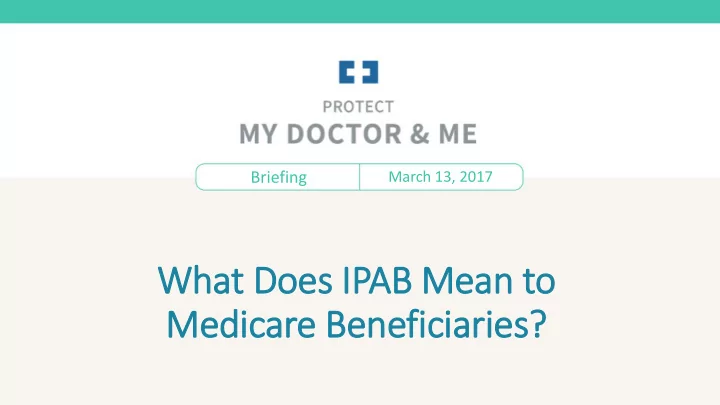

Briefing March 13, 2017 What D Does oes I IPAB AB M Mean t to o Medic icare B Benefic icia iarie ies?
The Independent Payment Advisory Board • Purpose: The Independent Payment Advisory Board was established in 2010 in an attempt to rein in excessive growth in Medicare spending. • Composition: The Board is comprised of 15 members nominated by the President and confirmed by the Senate who may not hold any other outside employment during his or her tenure on the board. Slide | 2
The Independent Payment Advisory Board • Trigger: If the CMS Actuary finds that per capita Medicare spending is projected to grow more quickly than the target growth rate, then the Board’s 15 members are charged with developing proposals to find a specified amount of savings in the Medicare program. • Initially, the target growth rate is a blend of medical inflation and general inflation. • Beginning in 2018, the target growth rate is GDP+1%. • The savings target is a percentage of the difference between the projected growth and the targeted growth rate. Slide | 3
The Independent Payment Advisory Board • Failsafe: If the Board fails to deliver its proposals (for example, because there are no Board members), then the authority to develop these proposals is delegated to the HHS Secretary. Since its enactment, no board members have been nominated or confirmed. As a result, today, the authority to propose Medicare savings rests solely with Secretary Price. Slide | 4
The Independent Payment Advisory Board • Proposals: After the CMS Actuary determines that the savings requirement is triggered, then the Board (or the Secretary in its place) must develop proposals to find savings in the Medicare program and submit them to the President. The proposals: • May only relate to Medicare; • Must result in a net reduction of total Medicare program expenditures “at least” equal to the savings target; and • May not “ration” care, raise revenues, raise premiums, increase cost-sharing, restrict benefits, or alter eligibility. Slide | 5
The Independent Payment Advisory Board • Lack of Judicial Review: The statute expressly prohibits any administrative or judicial review of the proposals delivered by the Board of the Secretary strongly limiting the ability of affected stakeholders from enforcing the law’s safeguards. • Implementation Year: The proposals delivered by the Board or the Secretary must achieve their required savings in a single year. Slide | 6
The Independent Payment Advisory Board • Fast-Track Consideration: Once proposals are developed by the Board or the Secretary and submitted to the White House, they are then submitted to Congress, who must consider the proposals under fast- track procedures: • Congress may only amend the IPAB implementing bill by finding at least the same amount of savings as in the Board or Secretary’s plans; • Senate floor time is limited; and • The motion to proceed is non-debatable. Slide | 7
The Independent Payment Advisory Board If the IPAB process is triggered in 2017, what happens next? Source: Kaiser Family Foundation, “The Independent Payment Advisory Board: A New Approach to Controlling Medicare Spending,” Slide | 8 2011, http://kff.org/health-reform/issue-brief/the-independent-payment-advisory-board-a-new/.
The Independent Payment Advisory Board • The Medicare Trustees project that IPAB will trigger for the first time this year. If no action is taken by Congress to repeal IPAB or pass its own Medicare cuts, then Secretary Price will be required by law to find and implement savings of at least $1.5 billion in Medicare in 2019. • The Medicare Trustees also project that IPAB will again trigger in 2022 and 2024, requiring the Board or the Secretary to find increasingly larger amounts of savings in Medicare with each trigger. Slide | 9
The Independent Payment Advisory Board • In the Senate, Senators Cornyn and Wyden have each introduced their own bills and resolutions to repeal IPAB. • Senator Cornyn’s legislation (S. 260 and S.J. Res 17) has 30 cosponsors. • Senator Wyden’s legislation (S. 251 and S.J. Res 16) has 9 cosponsors. • In the House, Representatives Roe (R-TN) and Ruiz (D-CA) have introduced a repeal bill (H.R. 849) and joint resolution (H.J. Res 51) to repeal IPAB with 24 cosponsors. Slide | 10
IPAB Repeal: Stay Informed • Learn more at www.ProtectMyDoctorAndMe.com • Follow us on Twitter at @MyDrAndMe Slide | 11
Recommend
More recommend